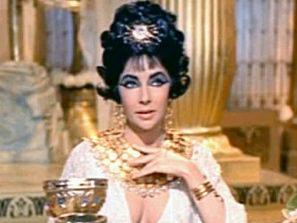Cleopatra the unalluring politician
Image of Elizabeth Taylor as Cleopatra.
This story was originally covered by PRI’s The Takeaway. For more, listen to the audio above.
Homely, ruthless, misunderstood and of Greek descent — this was Cleopatra. According to Stacy Schiff, the pharaoh was not the beautiful seductress imagined in films and plays. In the book Cleopatra: A Life, Schiff sets out to tell the true story.
The actresses who play Cleopatra, most famously Elizabeth Taylor and soon, Angelina Jolie, are knock-outs, but Cleopatra’s looks were not what made her great. Cleopatra probably had a big nose and sunken eyes, but she also had power and knew strategy. “She’s immensely influential in the sense that she occupies a strategic position geographically,” Schiff explains, “she controls this enormous fortune, and she is able to feed or starve the great military power, which is rising across the ocean.”
As a leader, she knew what she wanted. Cleopatra forced her brother off the throne that they were supposed to share, and she eliminated her other siblings. “She is a very clever, opportunistic and shrewd queen,” Schiff explains. At the time of her reign, the Roman Empire was gaining power and, in what Schiff believes to have been strategic moves, Cleopatra had children with Julius Caesar and then Mark Anthony.
“Does she set out to seduce them?” Schiff questions. “I’m sure there was some attempt there at politically making an alliance.” This was far from a story of passion and romance.
So why is Cleopatra so misunderstood? Schiff gives two reasons. Like so many political figures, the pharaoh was a victim of history written by her adversaries. “I think it’s very important for her enemies after her death to paint her as this shameless seductress.” She was also a victim of sexism, according to Schiff. “I think it’s easier for us to believe that a woman succeeds because of her beauty instead of her brain.”
—————————————————-
“The Takeaway” is a national morning news program, delivering the news and analysis you need to catch up, start your day, and prepare for what’s ahead. The show is a co-production of WNYC and PRI, in editorial collaboration with the BBC, The New York Times Radio, and WGBH.
